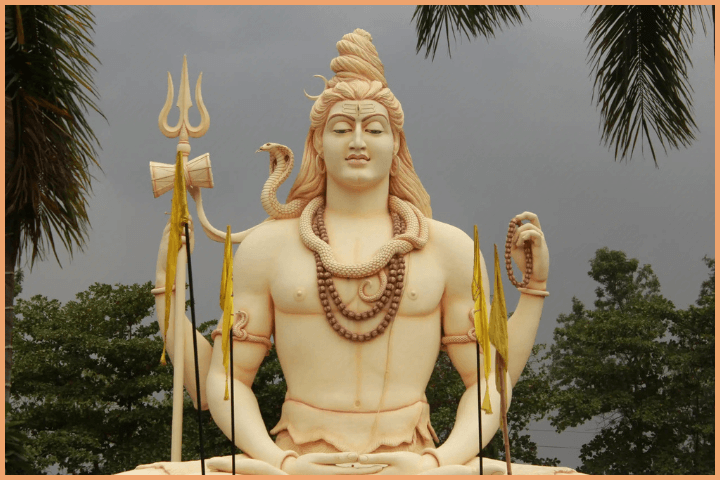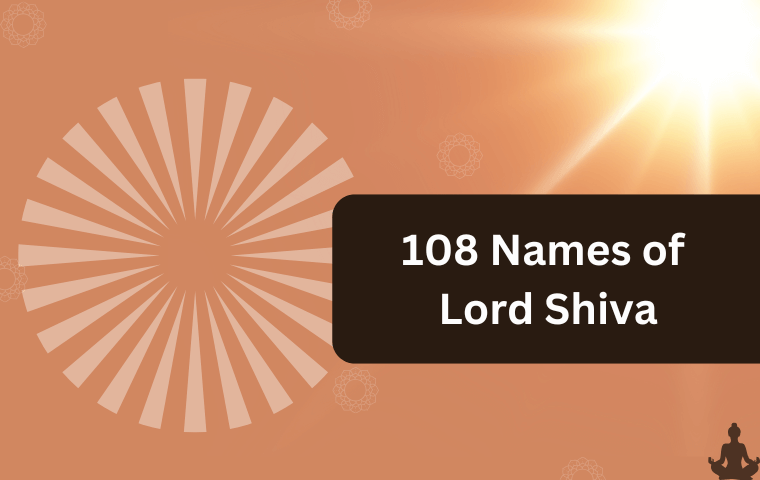Lord Shiva, a revered figure in Hinduism, is known by many names, each representing his divine attributes, powers, and forms. Among these, 108 names of Lord Shiva hold special spiritual significance. These names not only describe his cosmic roles as the creator, preserver, and destroyer but also highlight his boundless compassion, wisdom, and transcendence.
Let us explore the profound meanings and symbolism behind these sacred names of Lord Shiva.
The Significance of Lord Shiva’s 108 Names
The number 108 holds deep spiritual and sacred significance in Hinduism. It is believed that chanting Shiva’s 108 names with devotion purifies the soul, removes negativity, and connects the devotee with divine consciousness. Each name symbolizes a unique quality, form, or power of Shiva, offering a glimpse into his infinite nature.

According to yogic tradition, Shiva is worshipped in seven primary forms:
- Ishwara – The supreme cosmic lord.
- Shambho – The compassionate and benevolent one.
- Bho/Bhola – The simple and innocent form.
- Dakshinamurthy – The divine teacher of Vedic wisdom.
- Natesha – The cosmic dancer, representing rhythm and destruction.
- Kalabhairava/Mahakala – The fierce destroyer of evil.
- Somasundara – The beautiful, moon-adorned form.
From these core forms arise 1008 divine names, out of which 108 are widely chanted for their spiritual potency.
The Symbolism of Shiva’s Iconography
Lord Shiva’s appearance carries deep symbolic meanings:
- Third Eye: Represents spiritual wisdom and the destruction of ignorance.
- Crescent Moon: Symbolizes time, indicating his eternal nature.
- River Ganga Flowing from Hair: Represents purity and the flow of spiritual knowledge.
- Trident (Trishul): Signifies control over the three gunas – sattva (goodness), rajas (passion), and tamas (ignorance).
- Snake Around Neck: Reflects power over fear and death.
- Ash-covered Body: Symbolizes detachment from materialism.
List of 108 Names of Lord Shiva with Their Meanings
Here are some of the most significant names of Lord Shiva, along with their meanings:
- Shiva – The auspicious and pure one.
- Mahadeva – The supreme god.
- Neelakantha – The blue-throated one (after consuming poison during Samudra Manthan).
- Rudra – The fierce and roaring form.
- Bholenath – The simple and innocent lord.
- Gangadhara – The one who holds the sacred river Ganga.
- Trilochana – The three-eyed deity.
- Nataraja – The cosmic dancer.
- Dakshinamurthy – The teacher of ultimate knowledge.
- Mrityunjaya – The conqueror of death.
- Pashupati – Lord of all living beings.
- Vishwanatha – Master of the universe.
- Kalakala – The lord beyond time.
- Mahakala – The destroyer of time.
- Shoolin – The one who wields the trident.
- Somasundara – More beautiful than the moon.
- Kapalin – The wearer of skulls.
- Digambara – The sky-clad lord, symbolizing freedom from materialism.
- Avyaya – The eternal and imperishable one.
- Sadashiva – The eternal form of Shiva.
- Virabhadra – The fierce form created from Shiva’s anger.
- Jagadguru – The teacher of the universe.
- Parameshwara – The supreme lord.
- Shambhu – The source of divine bliss.
- Anagha – The sinless and pure one.
- Bhairava – The formidable form of Shiva.
- Jatin – The one with matted hair.
- Lalataksha – The one with an eye on the forehead.
- Vrishavahana – The one who rides the bull, Nandi.
- Kailashnath – The lord of Mount Kailash.
- Priyabhakta – The beloved of devotees.
- Omkar – The embodiment of the sacred sound ‘Om’.
- Skandaguru – The teacher of Lord Skanda (Kartikeya).
- Shankara – The giver of happiness and prosperity.
- Sarveshwara – The lord of all.
- Vedakarta – The creator of the Vedas.
- Hara – The remover of sins and suffering.
- Chandrashekhara – The one who wears the moon on his head.
- Bhuvaneshwara – Lord of the universe.
- Maheshwara – The supreme ruler.
- Shrikantha – The one with a glorious neck.
- Swayambhu – The self-born lord.
- Pushkara – The nourisher.
- Tejaswani – The illuminator.
- Kamalaksha – The lotus-eyed one.
- Trishoolin – The one carrying a trident.
- Vajrahasta – The one with a thunderbolt in hand.
- Lokankara – The creator of the world.
- Nityasundara – The ever-beautiful one.
- Durjaya – The invincible lord.
- Mahabuddhi – The one with supreme wisdom.
- Nagabhushana – The lord adorned with serpents.
- Giripriya – The one fond of mountains.
- Jaradhishamana – The redeemer of afflictions.
- Kailashadhipati – The master of Mount Kailash.
- Shantah – The peaceful one.
- Gurudeva – The divine teacher.
- Jagadisha – The ruler of the universe.
- Ravilochana – The one with the Sun as an eye.
- Mahanidhi – The great treasure.
- Shreshta – The most superior one.
- Someshwara – The lord of the moon.
- Bhudeva – The lord of the earth.
- Lingadhyaksha – The lord of the lingas.
- Bhasmodhulita – The one covered in sacred ashes.
- Omkara – The creator of the cosmic sound.
- Paramjyoti – The supreme light.
- Vishalaksha – The wide-eyed one.
- Anantadrishti – The one with infinite vision.
- Devadideva – The god of gods.
- Sarvayoni – The origin of all beings.
- Lokapal – The protector of the world.
- Dhyutidhara – The lord of brilliance.
- Sukhada – The giver of happiness.
- Bhutapala – The protector of all beings.
- Sarvacharya – The supreme teacher.
- Umapati – The consort of Uma (Parvati).
- Sarvatapana – The all-consuming lord.
- Mahamaya – The lord of great illusions.
- Trilokpati – The master of the three worlds.
- Varada – The granter of boons.
- Aja – The unborn one.
- Digambara – The sky-clad lord.
- Ajaya – The invincible one.
- Sthira – The steady one.
- Yogishwara – The lord of yogis.
- Vibhu – The all-pervading one.
- Bhutapati – The lord of spirits.
- Anaadi – The beginningless one.
- Mahakala – The great destroyer of time.
- Taraka – The great liberator.
- Adiyogi – The first yogi.
- Girish – The lord of mountains.
- Mahatapa – The great ascetic.
- Jagannatha – The lord of the worlds.
- Vishwarupa – The universal form.
- Tripurari – The slayer of Tripurasura.
- Daksha – The powerful lord.
- Vajrahasta – The thunderbolt wielder.
- Paramatma – The supreme soul.
- Vishwadeva – The lord of the universe.
- Bhuvaneshwara – The protector of creation.
- Sharva – The destroyer.
- Shoolapani – The trident-holder.
- Ananta – The endless one.
- Vajrapani – The one with a thunderbolt in hand.
- Taraka – The liberator.
- Parameshwara – The great god.
Conclusion
The 108 names of Lord Shiva represent his infinite nature and divine qualities. By chanting these names with devotion, devotees invoke his grace and experience inner transformation, peace, and spiritual awakening.

